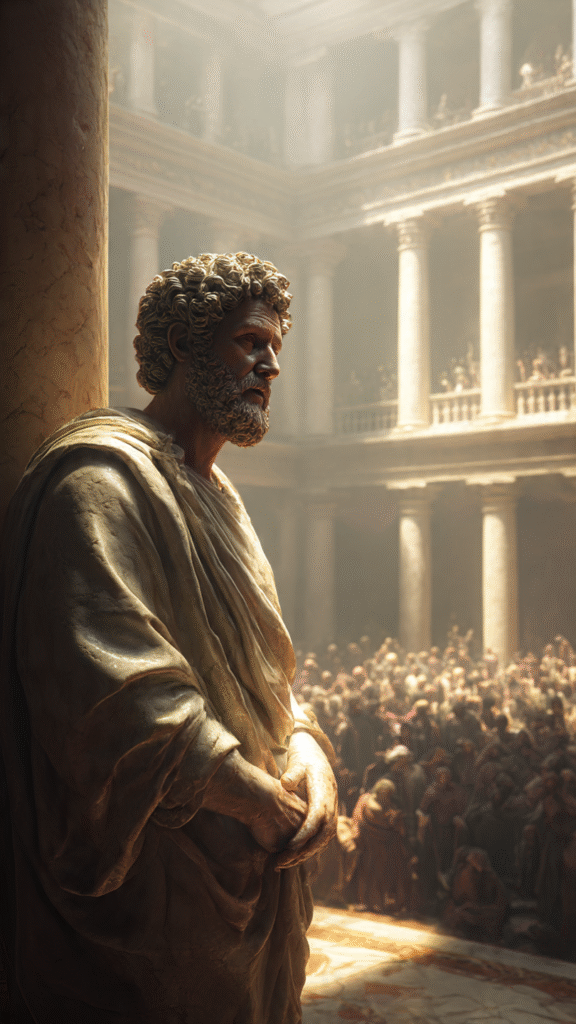Marcus Aurelius was a man of extraordinary knowledge and restraint. A philosopher on a throne, a leader who journaled about virtue and self-control while still carrying the weight of an empire. But yet, even this great Stoic struggled with one of life’s hardest lessons: How to see the good in people especially when their flaws were so obvious.
In his Meditations, Marcus often began his reflections with a weary tone. He spoke of waking up and preparing himself to meet “the meddling, the ungrateful, the arrogant, the deceitful, the envious, and the unsocial.” You can almost hear the sigh in his words, a philosopher bracing himself for the harshness of humanity. And yet, in the very next lines, he reminds himself that these people “are our kin,” that they act this way “out of ignorance of good and evil,” and that it is our duty to love and work with them, not despise them.
It was one of his most beautiful contradictions; that the same man who saw human nature so clearly also fought to forgive it daily.
The Temptation to Judge
If we are honest, I think in a way sometimes, if not most times, we all share Marcus’s struggle: It is easy to love humanity in theory but hard to love humans in practice. The coworker who slacks off; the family member who always complains; the friend who disappoints you again and again. Our natural impulse is to judge, to measure others by our own standards, to grow frustrated when they do not think, act, or care the way we do.

But here is the truth Marcus Aurelius wrestled with and we must embrace: People are not projects to fix, they are souls to understand and help.
The philosopher Marguerite Yourcenar, in Memoirs of Hadrian, imagined Marcus’s adopted grandfather saying: “Our great mistake is to try to exact from each person virtues which he does not possess, and to neglect the cultivation of those which he has.”
That is the essence of grace: To stop demanding what someone can not give and start nurturing what they can. And start helping them do better, be better.
The Wisdom of Seeing Strength in Weakness
When we focus only on what is missing in others, we blind ourselves to the quiet gifts they bring. The impatient person might still be deeply loyal; the shy one might be wise beyond words; the disorganized coworker might bring a warmth that steadies everyone else.
Every person carries something worth learning from, even if it is only a reminder of who we must not become. This does not mean ignoring wrongdoing or excusing laziness; it means seeing people as whole, capable of both failure and beauty. To find the good is not to deny the bad; it is to choose where to place your attention and energy.
As Marcus himself wrote, “When you arise in the morning, think of what a privilege it is to be alive, to think, to enjoy, and to love.” That love must extend beyond people who are more like you, to the difficult, to the very people who test our patience and challenge our composure.
Be The One Who Sees Potential, Not Perfection
Every leader, parent, teacher, or friend faces this moral crossroad: Will you see people for who they are, or for who they are not?
It is easy to give up on others, to dismiss, to label, to walk away, but it takes humility to look deeper, to see that maybe someone is not lazy but uninspired, not careless but afraid. Sometimes, what looks like resistance is just a cry for understanding.
The best leaders, and the wisest souls, are those who can look past weakness and call forth potential, and they do not just demand perfection; they cultivate growth.
That is the lesson Marcus Aurelius wrestled with but never fully mastered; it is one that calls out to all of us: To look for the good, even when it is buried under flaws; to forgive, even when it feels undeserved; and to love, even when it is hard.
Read Also: The Law of Effective Action: Doing The Right Things Before Doing Things Right
Read Also: The Courage to Think: Why Truth Often Offends Before It Enlightens
Read Also: The Elephant You Refuse to Face and Address Will Sit on Your Soul
Conclusion
Marcus Aurelius gave the world a philosophy of strength, restraint, and duty, but his greatest test and perhaps his unfinished lesson was compassion.
We, too, will meet people who drain us, disappoint us, and test the limits of our patience. But we must not let frustration close our hearts, because the measure of wisdom is not just how well we think, but how well we love the imperfect.
When you look at someone today, someone who annoys, frustrates, or fails you remember: You are seeing a soul still in progress, just like yours.
Find the good in them! Call it out! And in doing so, you will become a little more of the good the world so desperately needs.





